Social Skills Deficits in
Students with Disabilities
Successful Strategies from
the Disability Field
Edited by Helen Nicole Frye Myers
ROWMAN & LITTLEFIELD EDUCATION
A division of
ROWMAN & LITTLEFIELD PUBLISHERS, INC.
Lanham New York Toronto Plymouth, UK
Published by Rowman & Littlefield Education
A division of Rowman & Littlefield Publishers, Inc.
A wholly owned subsidiary of The Rowman & Littlefield Publishing Group, Inc.
4501 Forbes Boulevard, Suite 200, Lanham, Maryland 20706
www.rowman.com
10 Thornbury Road, Plymouth PL6 7PP, United Kingdom
Copyright 2013 by Helen Nicole Frye Myers
All rights reserved. No part of this book may be reproduced in any form or by any electronic or mechanical means, including information storage and retrieval systems, without written permission from the publisher, except by a reviewer who may quote passages in a review.
British Library Cataloguing in Publication Information Available
Library of Congress Cataloging-in-Publication Data
Social skills deficits in students with disabilities : successful strategies from the disability field / edited by Helen Nicole Frye Myers.
pages cm
Includes bibliographical references.
ISBN 978-1-4758-0112-5 (cloth : alk. paper)ISBN 978-1-4758-0113-2 (pbk. : alk. paper)ISBN 978-1-4758-0114-9 (electronic)
1. Students with disabilities. 2. Social skillsStudy and teaching. 3. Social skills in childrenStudy and teaching. 4. Children with social disabilitiesEducation. I. Myers, Nicole.
LC4015.S624 2013
372.37'4dc23
2012046145
 The paper used in this publication meets the minimum requirements of American National Standard for Information Sciences Permanence of Paper for Printed Library Materials, ANSI/NISO Z39.48-1992.
The paper used in this publication meets the minimum requirements of American National Standard for Information Sciences Permanence of Paper for Printed Library Materials, ANSI/NISO Z39.48-1992.
Printed in the United States of America
This book is dedicated to G.T. What a delightful young man you have become. You bring me such joy and happiness every day! I love you
to infinity and beyond and back again and am proud to be your mom!
Preface
Why Personal/Social Skills, and Why This Text?
The idea for this book came many years ago while one of the authors was working with middle school students with a variety of disabilities as a special education teacher in a public school system in Virginia. During those first years of teaching and later years serving as a mentor teacher and special education administrator, the author became more convinced that while we professionals (educators, school counselors, private counselors and therapists, and others) working with children with disabilities were making strides in coming up with academic supports to help students learn content better at school, we werent really doing such a good job at helping prepare students with disabilities to interpret communication and to succeed socially, especially once the children with disabilities transitioned from school to adulthood.
The author found that what students with disabilities really wanted and really lacked were social skills: to get along on the bus, to take a moment to see anothers perspective before engaging in an argument, to be able to participate in team sports and scouting, to understand other students and themselves better, and to have more friends.
The authors professional positions (community agency manager, special education teacher, residential counselor, special education teacher and administrator, and faculty in special education) have allowed her the opportunity to talk with multiple professionals working in the disability field to discuss these findings. She has also been fortunate to work at a university where she is able to keep abreast of current research on social skills development and to have the opportunity to attend trainings on the topic and to research and write on it, and to have developed a professional development course for those interested in seeking to better support students with disabilities socially. This book is the result of the work of many researchers in the disability field dedicated to improving the social skills of individuals with disabilities and that of the contributing authors, who are known for their exceptional work with children with disabilities.
Helen Nicole Frye Myers, PhD
Introduction
This book is organized differently from others on this topic. The goals for this book are for readers to understand the variety of social skills deficits associated with disability, the importance of supporting these skills, and the importance of collaboration and maintaining an eclectic approach to working with students with disabilities. This text provides readers with information on research-based strategies through the voices of multiple professionals in the field (chapter authors), so that readers may take the best of different approaches to create their own toolbox of strategies for use while they support students with disabilities.
Text Organization
The text begins by discussing the changing roles of professionals, setting the stage for readers to learn where we are and how we got here. Next, readers learn about research-based strategies found to be successful in working with students, and lastly, readers learn from professionals who are actively making a difference in the lives of students with disabilities through collaboration and the use of these strategies.
Text Benefits
Anyone working in the disability field quickly learns that education and support for kids with disabilities is a team effort. They also learn that not every approach works with every child and that most professionals use an eclectic approach of combining strategies to best support individual children. Teachers, administrators, school counselors, parents, private counselors, and agencies are all involved in developing the plans that best meet the needs of the student. For this reason, a variety of voices are heard throughout this text to help the reader learn from the best practices of a variety of fields. The goal is to provide the reader with an understanding of the issues involved in supporting students with disabilities and the variety of strategies that can be used to provide support in an effort to enhance the professional toolbox from which professionals and parents might be able to pull in helping the children with whom they work. The goal is to provide content in a way that professionals and parents might understand the social needs of students with disabilities and learn strategies they could start implementing with children with disabilities. The text is geared toward a variety of professionals, including university students in education, counseling, and psychology programs; teachers; counselors; administrators; and public school and private agency professionals.
Ways to Use This Text
The text provides an overview of the special social needs of students with disabilities and research-based strategies to help support children in these areas. The text can be used for undergraduate and graduate education, counseling, and psychology programs, as a stand-alone text or in conjunction with other course materials. It can be used as a part of a professional development course focusing on social skills. And lastly, it can be used by parents interested in learning more about social skills strategies.
Chapter 1
Professionals Roles in Supporting Social Skills
Helen Nicole Frye Myers
Chapter 1 focuses on the changing role of professionals during recent educational reform movements. As you read this chapter, consider the following questions:

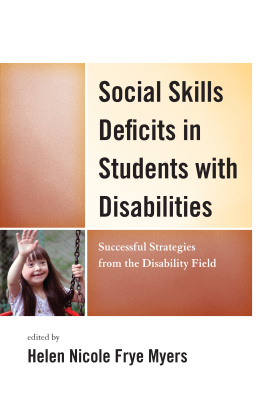

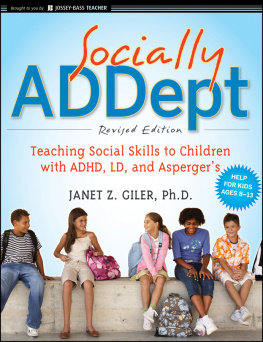
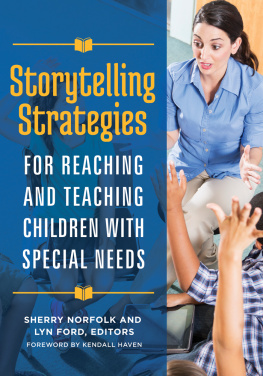
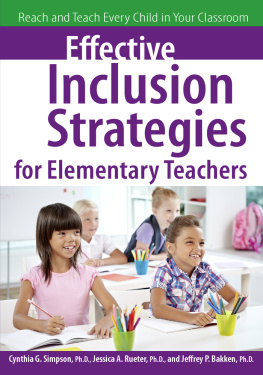
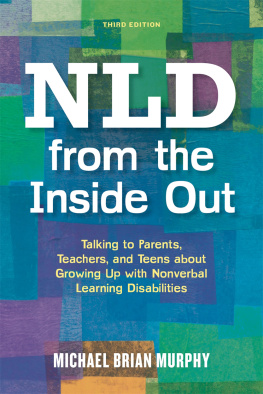
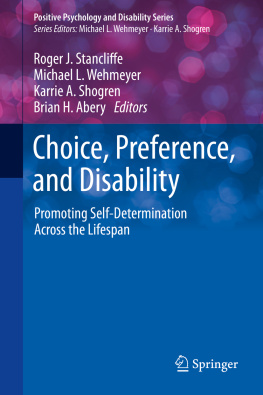
 The paper used in this publication meets the minimum requirements of American National Standard for Information Sciences Permanence of Paper for Printed Library Materials, ANSI/NISO Z39.48-1992.
The paper used in this publication meets the minimum requirements of American National Standard for Information Sciences Permanence of Paper for Printed Library Materials, ANSI/NISO Z39.48-1992.